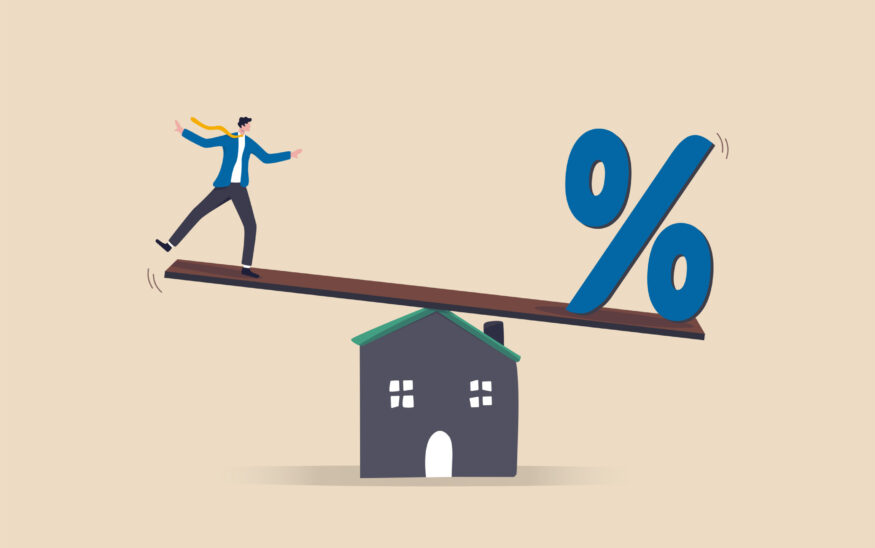4 Biggest Risks of Real Estate Investing in 2023 and How to Minimize Them
There's always been risks in real estate investing — that comes with the territory (literally). But, with the housing market finally slowing down, there's lots of potential for growth if you follow these investing tips.
Luke Babich //February 8, 2023//


4 Biggest Risks of Real Estate Investing in 2023 and How to Minimize Them
There's always been risks in real estate investing — that comes with the territory (literally). But, with the housing market finally slowing down, there's lots of potential for growth if you follow these investing tips.
Luke Babich //February 8, 2023//
Real estate investing is one of the surest paths to building wealth, but it’s not without certain risks. And in 2023’s unsettled and hazy market, those risks could sneak up on you.
With demand tanking, prices flattening, mortgage rates at historic highs, inventory increasing, and general inflation driving up costs across the board, this is a completely different market than the one that investors were operating in for the past decade. And the only thing the experts agree on is that no one knows where it’s going from here.
READ — How Do Interest Rates Impact Real Estate Investing?
So what should a real estate investor do in 2023? There’s no easy answer to that question, but we can tell you how to tackle and minimize some of the biggest risks of real estate investing in 2023.
If you’re flipping houses, you might want to consider becoming a landlord
Flipping houses has been extremely profitable for the past decade, but 2023 should see the market tightening up quite a bit. With demand sagging, rehab costs going up, and days on market doubling or even tripling, house-flippers have a little tougher path to profitability than before.
So why not try the landlord route? With mortgage rates at historic highs, many would-be home buyers are opting to rent. Going from “fix and flip” to “fix and hold” could be an easy way to wait out the market — while collecting some very nice rental income. Who knows, you might even prefer being a landlord to flipping houses.
Buying will be easy — maybe too easy
After years of maxed-out demand and escalating prices, the market has cooled. Put off by high mortgage rates, individual buyers are sitting out, and even iBuyers, stung by 2022’s flattened price curve, have largely paused their acquisitions. Inventory is inching up, projected to increase in 2023.
For individual investors, that means it’s going to be a lot easier to buy in the coming year. There are more properties to choose from, since competition is at a low ebb. For many investors, especially ones sitting on a lot of cash, this could present an irresistible opportunity to go on a buying spree.
But be careful! After so many years of steep competition, it’s easy to get caught up in the moment and snap up a property (or five) without doing your due diligence. Although it definitely makes sense to take advantage of a slow market, stay cautious, stick to your principles, keep an eye on your investment goals and resist the temptation to buy just because you can.
READ — Start Investing in Real Estate: 6 Tips for Millennials
Don’t forget to keep close track of your finances
No matter how solid your financial situation is, now is the time to keep a very close eye on your cash flow and your obligations. You’ve probably heard the expression, “death by a thousand cuts.” In 2023, you could very easily go broke by a thousand cuts.
Why? Well, the simple answer is that some investors are getting squeezed on both sides. Prices have flattened or declined in many markets. Interest rates have skyrocketed. The price of materials and contractors have increased. Rental rates have sagged, meaning that your income projections might fall short. Homes are sitting on the market longer, leading to carrying costs piling up, which can eat into your profit margins. Not to mention the historic inflation across the rest of the economy.
All of these little cost increases can add up faster than you think and burn through your cash reserves. Avoid being taken by surprise by keeping a close eye on your cash flow and constantly updating your projections with the latest data.
The market will evolve (again)
The pandemic seriously disrupted the real estate market almost overnight, as many fled large urban markets to settle in the suburbs and more rural areas. This deflated several booming city markets and sent prices rising in formerly sleepy regional markets. Investors followed, and some of the top house-flipping markets in 2022 were smaller cities like Greensboro, North Carolina, Scranton, Pennsylvania, and Buffalo, New York.
However, that trend seems to be on the verge of reversing in 2023. With the pandemic waning, many big employers are looking at ending or curtailing work-from-home policies, which would lead to a huge migration back to cities. That could give investors a bit of whiplash just when they thought they were settling into a new normal.
Avoid getting caught on the wrong side of the curve by keeping a close eye on movements in smaller, regional markets, as well as on big-picture employment issues. Then, allocate your money accordingly. And as you shift your investments between markets, don’t overlook new money-saving measures, such as buying or selling with low-cost real estate agents. Those commission savings add up fast!
 Luke Babich is the Co-Founder of Clever Real Estate, a real estate education platform committed to helping home buyers, sellers and investors make smarter financial decisions. Luke is a licensed real estate agent in the State of Missouri and his research and insights have been featured on BiggerPockets, Inman, the LA Times, and more.
Luke Babich is the Co-Founder of Clever Real Estate, a real estate education platform committed to helping home buyers, sellers and investors make smarter financial decisions. Luke is a licensed real estate agent in the State of Missouri and his research and insights have been featured on BiggerPockets, Inman, the LA Times, and more.

























